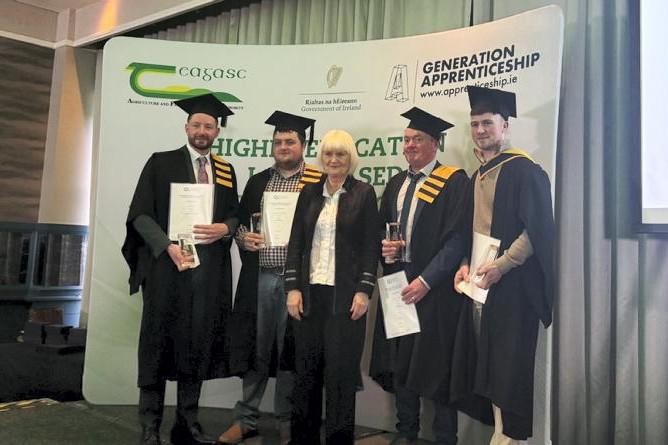Going to college is an expensive time. With the current accommodation shortage and the cost-of-living soaring, it can be a very difficult time for students to fund themselves financially.
Personally, I worked during the four years of my degree and, although it was difficult to manage that along with my academics, involvement in sports and social life, it was the only way I could be financially independent.
As I am from a single-parent family, I was also lucky enough to avail of the SUSI grant. This took a huge amount of the financial pressure away. I would recommend that all incoming students research and apply for the different grants and funding available; they are there to be utilised.
The cost of going to college
According to Zurich’s Cost of Education survey, the true annual cost of third-level education in Ireland for 2023 stands at:
€16,538 for an individual in student accommodation€11,560 for an individual in rented accommodation€6,461 for an individual living at homeStudent Grant Scheme
The Student Grant Scheme known as SUSI (Student Universal Support Ireland) is the main financial support scheme for students studying in Ireland.
Student grants are divided into:
Maintenance grantsFee grantsMaintenance grants help students with their living costs. Fee grants pay tuition fees for students who do not qualify for the Free Fees Scheme.
SUSI is open for applications for the academic year 23/24.
Changes to SUSI
There have been a number of changes to the Student Grant Scheme for the 2023/2024 academic year.
Undergraduate students from households earning between €62,000 and €100,000 can for the first time apply for a new €500 grant towards their student contribution fee. In addition to this, the amount a student can earn outside term time has increased from €4,500 to €6,552.
Before making an application, students can check out the eligibility indicator on susi.ie. This is a quick and easy way to get an indication of their eligibility for funding.
Undergraduate students from households earning between €62,000 and €100,000 can for the first time apply for a new €500 grant towards their student contribution fee
Student assistant fund
The Student Assistance Fund provides financial support to full or part-time students who are experiencing financial difficulties while attending college.
Students can apply for the Student Assistance Fund to help with either temporary or ongoing financial difficulties.
Students on full- or part-time courses leading to a higher education award (National Framework of Qualifications level 6-10) in Irish universities, institutes of technology and other approved colleges can apply.
How do I apply?
If you are in financial difficulty, you should contact the access or student services office in your college for more information on how to apply for the Student Assistance Fund.
Taking out a loan
If you do not qualify for any schemes or funds, you might need to consider taking out a loan.
There are a number of things to consider before you take out a personal loan. Students should ask themselves: “How much can I afford to borrow, and how long should I borrow for?”
The Annual Percentage Rate (APR) is a calculation of the overall cost of your loan. It is an annual rate that represents the actual yearly cost of the funds borrowed. It is important to do some market research here - what are the current interest rates banks are charging for loans (APR).
If you do not qualify for any schemes or funds, you might need to consider taking out a loan.
Credit union
The maximum interest rate on a loan which a credit union can charge is 12% (12.68% APR)*. Most credit unions have loan interest rates which are significantly lower than that and offer a loan interest rebate at the end of the year.
For more information, visit your local credit union’s website.
AIB
Students can borrow between €600 and €50,000 when you have a Student Plus account. The student loan interest rates at AIB are 8.15% and 8.45% APR (Annual Percentage Rate).
The student contribution charge loan allows students to borrow between €600- €3,000 for each year of your course (up to four) to cover the cost of your student contribution charge and other fees.
For example, if you want to take out a €6,000 loan in AIB, the student personal loan APR is 8.45% with monthly repayments of €122.06 and a total cost of credit €1,323.54.
For more information visi AIB.ie
Permanent TSB
TSB offers personal loans with a maximum APR of 14.3%. Maximum loan term 5 years for personal loans. Online approval in minutes is subject to a maximum loan amount of €25,000.
For example, if you want to take out a €6,0000 loan, the APR is 14.3% with monthly repayments of €137.75. The total cost of credit is €2,265.00. For more information, visit www.permanenttsb.ie
Bank of Ireland
Customers with a third-level student personal current account with bank of Ireland are eligible to take out a student loan if they are undertaking a full-time course in a recognised third level college in Ireland. The loan has an APR rate of 5%, where students can borrow up to €5,000 repaying it over one to five years.
For example, if you take out a loan of €5,000 over a 60 month period repayments are €94.20 per month at 4.95% variable (Annual Percentage Rate of Charge (APRC) 5.0%). Total amount repayable is €5,652.00. Total cost of credit is €652.00.
For more information, visit www.bankofireland.com
Teagasc student maintenance grants
In 2012, the Teagasc authority approved the implementation of means testing for maintenance grants aimed at students enrolled in advanced-level programs at both Teagasc and private agricultural colleges. This grant covers maintenance expenses and does not extend to covering any college fees.
The means testing applies to Teagasc Level 5 and Level 6 full-time courses for the academic year 2023/2024. I would recommend visiting the Teagasc website to check your eligibility for the grant as they have a list of conditions that outline income limits.
The Teagasc grant scheme will be implemented along the lines of the National Student Grant Scheme 2023, but varies in respect of what “add backs” are used to determine overall reckonable income.
The closing date for current applicants is 29 September 2023
For more information, visit https://www.teagasc.ie/education/going-to-college/student-maintenance-grants/1st-time-applicants/ or email teagascmaintenancegrant@southwestern.ie or phone: 0818 161 000
Read more
Finance: the benefits of being a registered employee on your family farm
Agri Careers: Getting ready for college financially
Going to college is an expensive time. With the current accommodation shortage and the cost-of-living soaring, it can be a very difficult time for students to fund themselves financially.
Personally, I worked during the four years of my degree and, although it was difficult to manage that along with my academics, involvement in sports and social life, it was the only way I could be financially independent.
As I am from a single-parent family, I was also lucky enough to avail of the SUSI grant. This took a huge amount of the financial pressure away. I would recommend that all incoming students research and apply for the different grants and funding available; they are there to be utilised.
The cost of going to college
According to Zurich’s Cost of Education survey, the true annual cost of third-level education in Ireland for 2023 stands at:
€16,538 for an individual in student accommodation€11,560 for an individual in rented accommodation€6,461 for an individual living at homeStudent Grant Scheme
The Student Grant Scheme known as SUSI (Student Universal Support Ireland) is the main financial support scheme for students studying in Ireland.
Student grants are divided into:
Maintenance grantsFee grantsMaintenance grants help students with their living costs. Fee grants pay tuition fees for students who do not qualify for the Free Fees Scheme.
SUSI is open for applications for the academic year 23/24.
Changes to SUSI
There have been a number of changes to the Student Grant Scheme for the 2023/2024 academic year.
Undergraduate students from households earning between €62,000 and €100,000 can for the first time apply for a new €500 grant towards their student contribution fee. In addition to this, the amount a student can earn outside term time has increased from €4,500 to €6,552.
Before making an application, students can check out the eligibility indicator on susi.ie. This is a quick and easy way to get an indication of their eligibility for funding.
Undergraduate students from households earning between €62,000 and €100,000 can for the first time apply for a new €500 grant towards their student contribution fee
Student assistant fund
The Student Assistance Fund provides financial support to full or part-time students who are experiencing financial difficulties while attending college.
Students can apply for the Student Assistance Fund to help with either temporary or ongoing financial difficulties.
Students on full- or part-time courses leading to a higher education award (National Framework of Qualifications level 6-10) in Irish universities, institutes of technology and other approved colleges can apply.
How do I apply?
If you are in financial difficulty, you should contact the access or student services office in your college for more information on how to apply for the Student Assistance Fund.
Taking out a loan
If you do not qualify for any schemes or funds, you might need to consider taking out a loan.
There are a number of things to consider before you take out a personal loan. Students should ask themselves: “How much can I afford to borrow, and how long should I borrow for?”
The Annual Percentage Rate (APR) is a calculation of the overall cost of your loan. It is an annual rate that represents the actual yearly cost of the funds borrowed. It is important to do some market research here - what are the current interest rates banks are charging for loans (APR).
If you do not qualify for any schemes or funds, you might need to consider taking out a loan.
Credit union
The maximum interest rate on a loan which a credit union can charge is 12% (12.68% APR)*. Most credit unions have loan interest rates which are significantly lower than that and offer a loan interest rebate at the end of the year.
For more information, visit your local credit union’s website.
AIB
Students can borrow between €600 and €50,000 when you have a Student Plus account. The student loan interest rates at AIB are 8.15% and 8.45% APR (Annual Percentage Rate).
The student contribution charge loan allows students to borrow between €600- €3,000 for each year of your course (up to four) to cover the cost of your student contribution charge and other fees.
For example, if you want to take out a €6,000 loan in AIB, the student personal loan APR is 8.45% with monthly repayments of €122.06 and a total cost of credit €1,323.54.
For more information visi AIB.ie
Permanent TSB
TSB offers personal loans with a maximum APR of 14.3%. Maximum loan term 5 years for personal loans. Online approval in minutes is subject to a maximum loan amount of €25,000.
For example, if you want to take out a €6,0000 loan, the APR is 14.3% with monthly repayments of €137.75. The total cost of credit is €2,265.00. For more information, visit www.permanenttsb.ie
Bank of Ireland
Customers with a third-level student personal current account with bank of Ireland are eligible to take out a student loan if they are undertaking a full-time course in a recognised third level college in Ireland. The loan has an APR rate of 5%, where students can borrow up to €5,000 repaying it over one to five years.
For example, if you take out a loan of €5,000 over a 60 month period repayments are €94.20 per month at 4.95% variable (Annual Percentage Rate of Charge (APRC) 5.0%). Total amount repayable is €5,652.00. Total cost of credit is €652.00.
For more information, visit www.bankofireland.com
Teagasc student maintenance grants
In 2012, the Teagasc authority approved the implementation of means testing for maintenance grants aimed at students enrolled in advanced-level programs at both Teagasc and private agricultural colleges. This grant covers maintenance expenses and does not extend to covering any college fees.
The means testing applies to Teagasc Level 5 and Level 6 full-time courses for the academic year 2023/2024. I would recommend visiting the Teagasc website to check your eligibility for the grant as they have a list of conditions that outline income limits.
The Teagasc grant scheme will be implemented along the lines of the National Student Grant Scheme 2023, but varies in respect of what “add backs” are used to determine overall reckonable income.
The closing date for current applicants is 29 September 2023
For more information, visit https://www.teagasc.ie/education/going-to-college/student-maintenance-grants/1st-time-applicants/ or email teagascmaintenancegrant@southwestern.ie or phone: 0818 161 000
Read more
Finance: the benefits of being a registered employee on your family farm
Agri Careers: Getting ready for college financially









SHARING OPTIONS